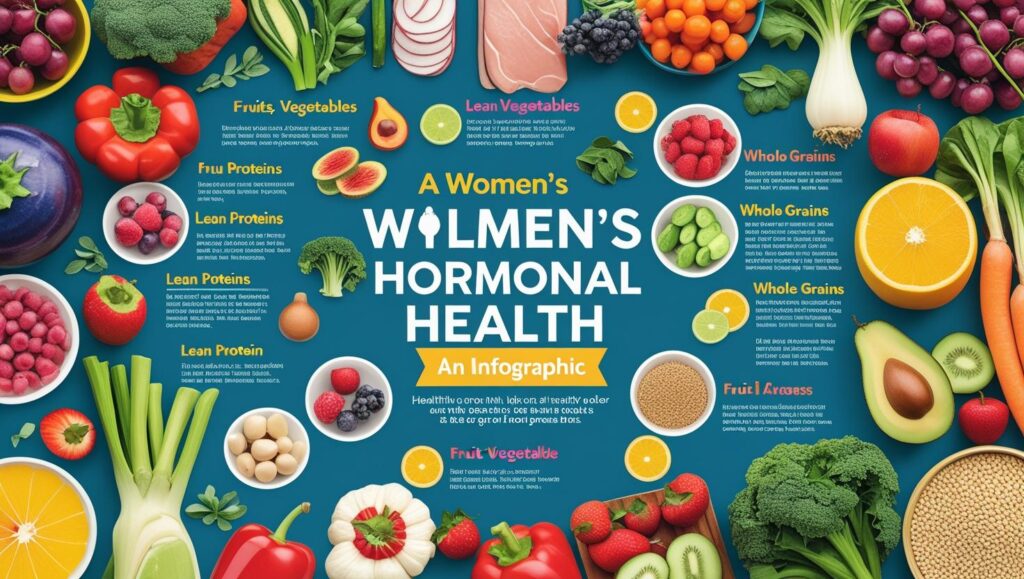Introduction
Hormonal imbalances can wreak havoc on your energy, mood, weight, and overall well-being. In 2025, with stress levels rising and lifestyle changes impacting health, more women are seeking natural ways to balance hormones without relying solely on medication. Whether you’re dealing with irregular periods, fatigue, or mood swings, this guide offers science-backed, practical tips to help you restore hormonal harmony naturally. Let’s explore how to balance hormones naturally, why it matters, and actionable steps you can start today.

Why Hormonal Health Matters in 2025
Hormones like estrogen, progesterone, cortisol, and insulin regulate everything from metabolism to mood. Imbalances can lead to symptoms like weight gain, acne, insomnia, or even serious conditions like PCOS or thyroid disorders. According to the Cleveland Clinic, 80% of women experience hormonal fluctuations at some point, often triggered by stress, poor diet, or environmental factors. With new research in 2025 highlighting the role of lifestyle in hormonal health, natural solutions are gaining traction for their accessibility and effectiveness.
Balancing hormones naturally not only alleviates symptoms but also promotes long-term wellness. By focusing on diet, stress management, and lifestyle tweaks, you can support your body’s endocrine system and feel your best. Below are the top strategies to achieve this, optimized for women in 2025.
1. Optimize Your Diet for Hormonal Balance
Your diet plays a critical role in hormone production and regulation. Nutrient deficiencies or excessive processed foods can disrupt insulin, cortisol, and sex hormones. Here’s how to eat for hormonal health:
- Incorporate Healthy Fats: Omega-3 fatty acids, found in salmon, chia seeds, and walnuts, support hormone production. A 2025 study from the Journal of Endocrinology suggests omega-3s reduce inflammation, which can stabilize cortisol levels.
- Eat Fiber-Rich Foods: Vegetables like broccoli, kale, and Brussels sprouts contain compounds that help detox excess estrogen. Aim for 25-30 grams of fiber daily to support gut health, which is linked to hormonal balance.
- Balance Blood Sugar: Avoid refined carbs and sugars that spike insulin. Opt for complex carbs like quinoa or sweet potatoes, paired with protein, to stabilize blood sugar levels.
- Add Hormone-Healthy Superfoods: Foods like avocados, flaxseeds, and berries are rich in antioxidants and phytoestrogens, which mimic estrogen to balance levels naturally.
Action Step: Create a weekly meal plan with 3 servings of cruciferous vegetables, 2 servings of fatty fish, and 1-2 tablespoons of flaxseeds daily.

2. Manage Stress to Lower Cortisol
Chronic stress elevates cortisol, which can disrupt estrogen, progesterone, and thyroid hormones. In 2025, with hybrid work and digital overload, stress management is more crucial than ever. Here’s how to keep cortisol in check:
- Practice Micro-Meditations: Even 2-5 minutes of deep breathing or guided meditation daily can lower cortisol. Apps like Calm or Headspace offer quick sessions tailored for busy women.
- Try Adaptogens: Herbs like ashwagandha and rhodiola, backed by 2025 research from the National Institutes of Health, help regulate cortisol. Consult a healthcare provider before starting supplements.
- Prioritize Sleep: Poor sleep spikes cortisol and disrupts melatonin. Aim for 7-8 hours of quality sleep by avoiding screens 1 hour before bed and maintaining a consistent sleep schedule.
Action Step: Set a daily 5-minute mindfulness practice and consider an adaptogen like ashwagandha (300-600 mg daily, per doctor’s advice).
3. Exercise Smart for Hormonal Health
Exercise can balance hormones, but overdoing it can increase cortisol and disrupt your cycle. Functional fitness, a top trend in 2025, is ideal for hormonal health. Here’s how to move your body wisely:
- Strength Training: Lifting weights 2-3 times a week boosts insulin sensitivity and supports testosterone balance, per a 2025 study in Sports Medicine.
- Low-Impact Cardio: Activities like walking or yoga improve circulation without spiking cortisol. Aim for 150 minutes of moderate cardio weekly.
- Avoid Overtraining: High-intensity interval training (HIIT) is great but limit it to 1-2 sessions per week to prevent hormonal stress.
Action Step: Try a 20-minute yoga flow or bodyweight strength routine 3 times a week, focusing on movements like squats and lunges.

4. Support Gut Health for Hormonal Harmony
The gut-hormone connection is a hot topic in 2025, as 70% of serotonin is produced in the gut, influencing mood and hormonal balance. A healthy gut also helps metabolize excess hormones. Here’s how to optimize gut health:
- Eat Probiotic Foods: Yogurt, kefir, and sauerkraut introduce beneficial bacteria. A 2025 study from Gut Microbes links probiotics to reduced hormonal inflammation.
- Limit Gut Disruptors: Avoid artificial sweeteners and processed foods that harm gut flora. Opt for whole foods instead.
- Stay Hydrated: Drinking 8-10 cups of water daily supports digestion and hormone detoxification.
Action Step: Add 1 serving of probiotic-rich food (like Greek yogurt) to your daily diet and drink a glass of water every 2 hours.
5. Avoid Endocrine Disruptors
Environmental toxins, like BPA in plastics or parabens in cosmetics, mimic hormones and cause imbalances. In 2025, awareness of endocrine disruptors is growing. Here’s how to minimize exposure:
- Choose Clean Products: Use BPA-free containers and natural skincare products. Check labels for “paraben-free” or “phthalate-free.”
- Filter Your Water: Use a carbon or reverse osmosis filter to remove hormone-disrupting chemicals.
- Go Organic When Possible: Pesticides on produce can act as endocrine disruptors. Prioritize organic for the “Dirty Dozen” (e.g., strawberries, spinach).
Action Step: Replace one plastic container with glass and check your cosmetics for harmful chemicals this week.
6. Get Regular Check-Ups and Track Symptoms
Hormonal imbalances can stem from underlying conditions like PCOS or hypothyroidism. Regular monitoring ensures you catch issues early. In 2025, wearable health tech makes tracking easier:
- Monitor Symptoms: Use apps or journals to track periods, mood, and energy levels. Look for patterns like irregular cycles or fatigue.
- Get Blood Tests: Work with a doctor to check levels of thyroid hormones, estrogen, progesterone, and cortisol annually.
- Use Wearables: Devices like Fitbit or Oura ring track sleep and stress, providing insights into hormonal health.
Action Step: Schedule a hormonal health check-up and start a symptom tracker using a free app like Clue.

Conclusion: Take Control of Your Hormonal Health in 2025
Balance hormones, naturally, is within your reach with the right diet, stress management, exercise, and lifestyle changes. By incorporating these evidence-based tips, you can reduce symptoms like fatigue, mood swings, and weight gain while boosting overall wellness. Start small—pick one or two strategies, like adding flaxseeds to your diet or practicing daily mindfulness—and build from there. Consistency is key to seeing results.


